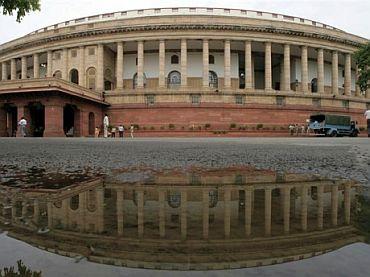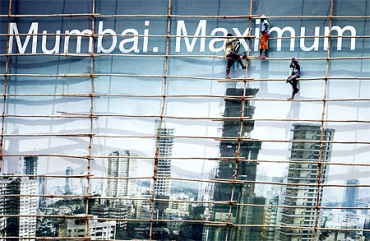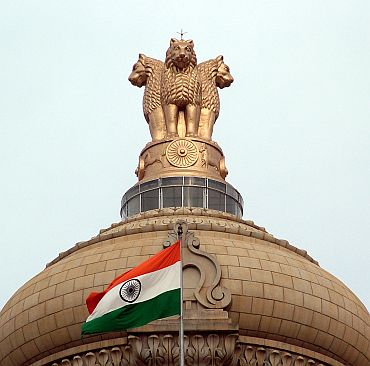MR Venkatesh
The third schedule of the Indian Constitution provides for the forms of oaths and affirmation by a Union Minister when assuming office.
The form of oath for a Union Minister is interesting. It states "I, A.B do swear in the name of God (or solemnly affirm that) I will bear true faith and allegiance to the Constitution of India as by law established, that I will uphold the sovereignty and integrity of India, that I will faithfully and conscientiously discharge my duties as a Minister for the Union and that I will do right to all manner of people in accordance with the Constitution and the law, without fear or favour, affection or ill-will."
...
Are ministers working for us or corporates?
Image: Rules of the game are bent beyond ones comprehension.In contrast to this, recent experiences demonstrate that most of our ministries function as a fiefdom of our ministers.
Decisions are arbitrarily taken, delayed or reversed. No questions asked and no answers offered.
Policy flip-flops are common, policy hijack widespread and violation of policy, the norm. Rules of the game are bent beyond ones comprehension.
Government owned enterprises are systemically bled to their bankruptcies.
Importantly, all these are scientifically planned and carried out with military precision.
In the process it is indeed appalling to note that most ministers in the Union Cabinet, more so in the economic ministries, are representing specific corporate interests than the interest of the people.
The galling part is that it is apparent.
...
Are ministers working for us or corporates?
Image: Policies in India are available to the highest bidder.Corporate India has now come to the belief that they can direct their growth by managing, controlling or leveraging this paradigm to their advantage.
What is worrying is that little do we realise that the promised gains of liberalisation policies ushered in 1991 may well go down the drain.
Surely, we run the risk of dynamiting the functioning of market from within.
The depressing part is that we can do very little about it. When questioned, ministers hop channel to channel (and appear live simultaneously in a few at the same time) and shamelessly defend their actions.
Better still, they claim that the "decision" was the collective decision of the union cabinet.
...
Are ministers working for us or corporates?
Image: Civil aviation ministry is a classic example of all that is wrong.Most of the "decisions" taken from the choice of the aircraft to the selection of on-board cutlery are suspect.
Sometimes they are purely bad decisions taken by incompetent set of officials.
While that is unacceptable but yet has come to be acknowledged as a part of our system.
A secretary at the ministry of agriculture may become a secretary at the civil aviation next year who may well become the finance secretary the following year and be drafting the Union Budget and hence may not have the necessary expertise to manage the ministry.
...
Are ministers working for us or corporates?
Image: Bureaucracy is culpable too.Civil Aviation or Rural Affairs - does it matter given the overall quality of our bureaucracy? Your guess is as good as mine.
But the issue on hand is does not involves our bureaucracy - though in this policy trading and hijack they too are culpable.
The extant issue on hand involves "decisions" taken our ministers and much more.
...
Are ministers working for us or corporates?
Image: CAG report brings to the fore all that is wrong in India.It points out that the decision to expand fleet was delayed for nearly a decade and suddenly gained momentum.
This meant hasty reworking of its acquisition plans and dramatic increase in number of aircraft to be purchased.
The report bluntly states that "this increase in numbers does not withstand audit scrutiny, considering the market requirements obtaining then or forecast for the future as also the commercial viability projected to justify the acquisition."
Crucially it points out that the acquisition appears to be "supply-driven".
...
Are ministers working for us or corporates?
Image: Report comes down heavily on evaluation process.The report is equally categorical when it states that many of the key assumptions underlying the project report leading to the fleet acquisition were intrinsically flawed, increase in market shares projections un-validated and yield increases unduly optimistic.
Why? The answer to this question is obvious and perhaps does not require any elaboration in the current political context.
Importantly, a report by a Constitutional Authority cannot be more explicit than this.
...
Are ministers working for us or corporates?
Image: Air India has more than Rs 38,000 crore debt.At times revenue generated does not meet even the cash cost. Its on time performance (so vital in airline industry) is abysmal and way below the industry standards.
It has accumulated debt is in excess of Rs 38,000 crore (Rs 380 billion) as on March 31, 2010.
Similarly the CAG Report on the Performance Audit of Hydro-carbon Production sharing Contracts primarily blames the government for lack of adequate competition; awarding contracts on single financial bids; major revisions in scope, quantities, specifications and variations affected after opening of the financial bids for the higher outgo on goods and services that has adverse implications for cost-recovery and government's financial take.
...
Are ministers working for us or corporates?
Image: The whole deal smells of corruption.In our scheme of things we will never know.
But the fact is that the entire issue in both cases, as the CAG report points out, revolves around several procedural violations.
It is obvious that such gross violations of well established procedures at several layers of our government are an outcome of massive doses of corruption, including one at the highest levels.
...
Are ministers working for us or corporates?
Image: Trend is to ensure that government enterprises are forced to underperform.After all, in our system whenever government enterprises underperform, one can readily blame it on everyone but simultaneously ensure that no one is specifically accountable.
That explains why ministers when asked to explain underperformance of government enterprises attached to their ministries rush to lay all the decisions on the Union Cabinet.
The underlying idea is that one can blame but not hold the entire Union Cabinet accountable for the underperformance of a ministry.
Yet, the fundamental question remains - who is the largest beneficiary of such gross mismanagement by the government?
The answer to this question is a no-brainer.
...
Are ministers working for us or corporates?
Image: Corporate India is equally guilty of large-scale corruption.No wonder, Corporate India is silent on all this. An amendment to a Service Tax provision or a change to the TDS provision under the Income-Tax Act will set our chambers of commerce, trade and industry on fire.
In contrast, corruption, nepotism and crony capitalism are referred to only in hushed tones and that too in passing.
Rarely has corruption been discussed and debated by Corporate India openly.
Rarer still has it come with any concrete solutions or suggestions. And whenever it has done it has bordered on the ludicrous.
...
Are ministers working for us or corporates?
Image: Corporate corruption dents the image of India.Lest the reader believes that all these are references only to the corrupt practices within the government, he would be sadly mistaken. Increasingly, the world believes that the success of Indian corporates in India is because of their ability to bend and change the rules of the game.
Interestingly, that is what most captains of the industry believe about their competitors and other business houses.
And that, to a large extent, dents the image of India, Indians and Indian enterprise.
...
Are ministers working for us or corporates?
Image: Niira Radia tapes revealed the other side of corporate India.Yet, corporate India officially swears by ethics and mindlessly celebrates its allegiance to its own brand of corporate governance.
In the process, little do we realize that corporate India is in effect responsible for managing the supply side of every rupee of bribe paid.
After all, bribery required a giver and taker.
But all this is resolved when corporate interest merges with interests of our ministers.
In such a diffused scenario it is in the interest of corporates in getting their nominees specifically appointed as ministers. Remember Niira Radia tapes?
Interestingly and inadvertently this solves the issue of corruption all in one stroke. When the corruptible merge with the corrupt where is the question of corruption?
That explains why ministers after ministers are behaving as representatives of specific corporate houses and not elected representatives.
How about Minister for Reliance, Tatas, Mahindras, Adanis, Sun TV, Jet Airways, Bharathi Telecom, GMR...?
The author is a Chennai-based Chartered Accountant. Comments can be sent to mrv@mrv.net.in














article